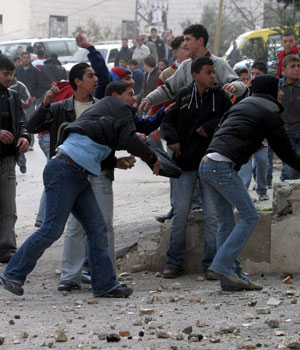
Several hundred Palestinians attack the TIPH (Temporary International Presence in Hebron) headquarters in the West Bank city of Hebron, 08 February 2006 (EPA)
GAZA CITY, Gaza Strip (AP) – Two masked gunmen shot out the tires of a diplomatic vehicle and kidnapped Egypt’s military attache to the Palestinian Authority on Thursday, in a brazen daylight abduction just outside the heavily guarded Egyptian mission in Gaza City.
The kidnapping of a diplomat from one of the Palestinians’ most important allies signaled that no one was immune from the increasing lawlessness in the Gaza Strip. Egypt, a frequent mediator between militants and Palestinian leader Mahmoud Abbas, is seen by some as the only chance for maintaining some stability in Gaza.
The militants ambushed Hussam Almousaly’s car about 200 yards (meters) from the Egyptian mission and kidnappe him, another Egyptian diplomat said, speaking on condition of anonymity because he was not authorized to speak to the media.
The identity of the gunmen or their motive was not immediately known.
Palestinian security officials set up roadblocks throughout Gaza to try to find the kidnappers. Six police cars patrolled the area of the abduction, and officers were questioning possible witnesses.
“We totally condemn such acts,” Palestinian Prime Minister Ahmed Qureia said, identifying the kidnapped man as Egypt’s military attache.
Gaza militants have kidnapped about 20 foreigners in recent months, using their hostages to try to get jobs from the Palestinian Authority or to force it to release their jailed comrades. The Palestinian Authority routinely accedes to their demands, and all of the previous hostages have been released unharmed.
Almousaly’s kidnapping was the most serious attack against diplomats in Gaza since unidentified militants bombed a convoy of U.S. diplomats in October 2003, killing three American security guards.
The kidnapping came amid a flare-up in violence between Israel and Palestinian militants over the past week, with Palestinians launching rockets from Gaza against southern Israeli towns, and Israel retaliating with artillery fire and airstrikes. Over the past week, 14 Gaza militants have been killed in airstrikes and other violence.
Early Thursday, two militants threw hand grenades and opened fire on Israeli forces at the Erez checkpoint, where thousands of Palestinian laborers cross from Gaza into Israel every day. Israeli troops shot them dead in a gunbattle, and the bomb belt they were carrying exploded, the army said. No Israeli soldiers were wounded.
The violent groups, the Popular Resistance Committees and Al Aqsa Martyrs’ Brigades claimed joint responsibility for the attack in a call to The Associated Press. Al Aqsa is a violent offshoot of Abbas’ Fatah Party, which was defeated by Hamas in last month’s parliament election. The army closed Erez.
Hours later, just one mile (2 kilometers) from Erez, Israeli troops opened fire on two people planting an explosive device near the security fence between Gaza and Israel, killing one and wounding another.
Also Thursday, Palestinian officials said they would begin paying government employees their overdue January salaries despite a severe budget crisis. The Palestinian Authority borrowed some payroll money from banks, after several Arab countries did not transfer millions they had promised, said the deputy finance minister, Jihad al-Wazir.
The cash-strapped Palestinian Authority needs $116 million (¤97 million) to pay 137,000 employees every month. In the past, the government has borrowed from banks to make the payroll, in addition to relying on foreign aid and millions of dollars in monthly tax transfers from Israel.
The perpetual crisis is likely to worsen in the wake of the Hamas’ election victory. Foreign donor countries threatened to cut off aid and Israel said it would halt the tax transfers once Hamas forms a government.
In Washington, acting Israeli Foreign Minister Tzipi Livni said that after Hamas forms a government, the Palestinian Authority could be designated a “terrorist state.”
Speaking Wednesday after meeting U.S. Secretary of State Condoleezza Rice, Livni said the international community has its “own sanctions and measures when it comes to an entity which transfers into a terror entity.”
Also Wednesday, demonstrations over a cartoon depicting the Prophet Mohammad turned ugly when protesters in the West Bank city of Hebron attacked the headquarters of an international monitoring group. The monitors left the city after the assault, which was the most violent Palestinian protest against the cartoons.
Protests began sweeping the Muslim world more than a week ago over the cartoons, which were first printed in Denmark.
One cartoon depicted Mohammad wearing a bomb-shaped turban. About 300 protesters in Hebron overpowered Palestinian police and stormed the peacekeepers’ three-story building, breaking windows and smashing cars, while chanting slogans against the cartoons. A few broke into the building but were repulsed by monitors swinging clubs.
Eleven Danish members of the Temporary International Presence in Hebron pulled out last week, but after the attack Wednesday, all 60 members of the mission’s foreign staff who were inside the building decided to leave for their own safety, mission spokeswoman Gunhild Forselv said.
“It is a very sad day, and we hope to return as soon as possible,” Forselv said.
The mission was deployed in 1994 after Baruch Goldstein, a U.S.-born Israeli settler, massacred 29 Palestinians at the city’s contested holy site, the traditional burial cave of the biblical Abraham, Isaac and Jacob and three of their wives. The mission’s mandate was to report on tensions between Palestinians and the small group of Jewish settlers in the city.

A Palestinian man looks at Temporary International Presence in Hebron, or TIPH, vehicles leave their offices in the West Bank town of Hebron, Feb. 8, 2006 (AP)

A Palestinian worker removes a shattered window at the Temporary International Presence (TIPH) offices in the West Bank town of Hebron, Feb. 8, 2006 (AP)
